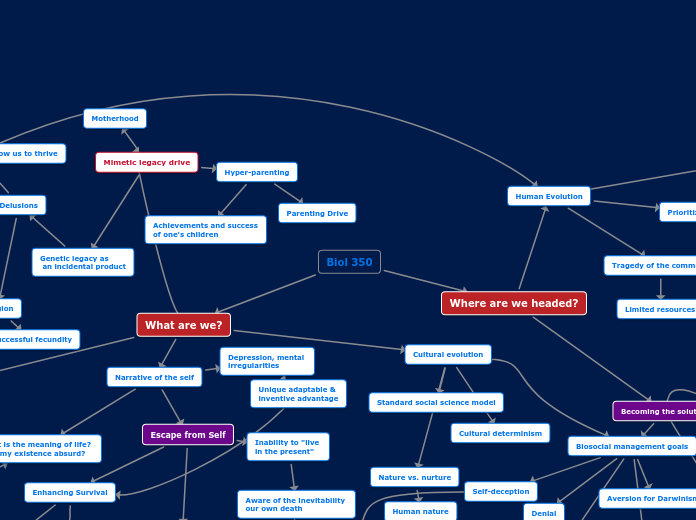Biol 350
What are we?
Biological evolution
Evolutionary science model
Genetic determinism
Nature vs. nurture
Evolutionary fitness
Trade-offs
Sexual behaviour differences between males and females
Paternity uncertainty
Subjugation of women
Polygyny
Skewed distribution of wealth
With wealth, value sons
Without wealth, value daughters
Monogamy
Reduced paternity uncertainty
Marriage
Freemale culture
Mimetic legacy drive
Genetic legacy as
an incidental product
Delusions
Easily distracted from what we are
Susceptibility to visual illusions
Productive illusions that allow us to thrive
Religion
Extension of self through "soul"
Post-self transcendence
Successful fecundity
Hyper-parenting
Achievements and success of one's children
Parenting Drive
Motherhood
Narrative of the self
Escape from Self
Self-Impermanence Anxiety
Leisure Drive
Sensual Pleasure
temporary conspicuous consumerism
Intellectual pleasure
Wonder
Gives meaning to life
(hedonic wellbeing)
Social Pleasure
Ancestral anxiety buffers
Modern "death-defying"
distractions
Enhancing Survival
Survival drive
Sex drive
Inability to "live
in the present"
Aware of the inevitability
our own death
what is the meaning of life?
Is my existence absurd?
Depression, mental
irregularities
Unique adaptable &
inventive advantage
Cultural evolution
Cultural determinism
Standard social science model
Nature vs. nurture
Human nature
Motivations
Emotions, behaviours & cultures
Immoral/evil behaviour
War
Self-deception
Glorify war
Morality
Group cooperation
Altruism
Conscious giving
Reproductive success
Universal/Golden Rule
Where are we headed?
Human Evolution
Tragedy of the commons
Limited resources
Prioritizes fitness
Increase in population size,
but only to finite maximum
Increase in impoverished
and starving people
Moral dilemma
Try to feed
starving people
Increase in food production
Stand by and
watch them starve
Unsustainable
Collapse of civilization
Becoming the solution
Biosocial management goals
Self-deception
Self-impermanence anxiety
Leisure drive
Legacy drive
Denial
Temporal discounting
Aversion for Darwinism
Moral enhancement
Shame
Perennial challenge
Institutional redesign
Pharmaceuticals
Transhumanism
Cultural change
No prevention of mortality
Increased average age
of 30 at first birth
Limit of one
child per female
Population control
Potential solution
Pleasurable because it rewarded the reproductive success of our ancestors
Technological advancement
Illusions
Benefits of new technology
will always minimize costs
No technical solution will rescue
us from misery of overpopulation
Benefits of new technology
will exceed costs
Freedom to explore new technology eventually results in disaster
